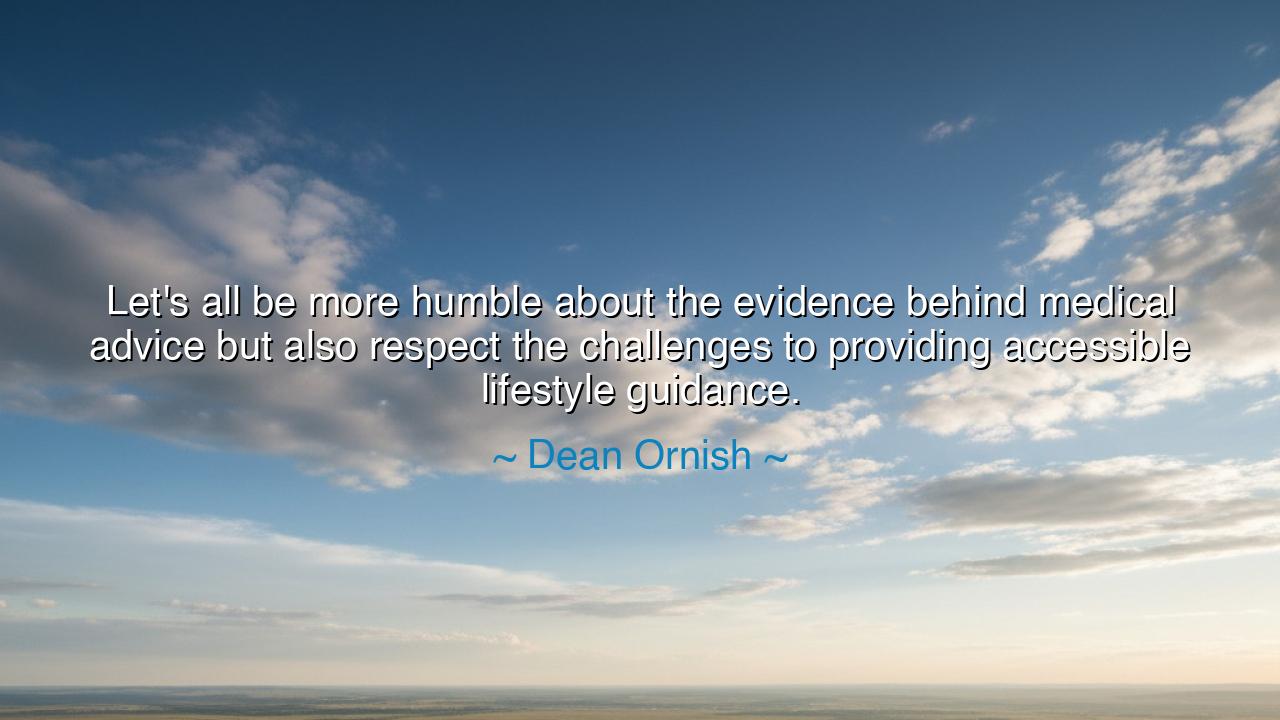
Let's all be more humble about the evidence behind medical advice
Let's all be more humble about the evidence behind medical advice but also respect the challenges to providing accessible lifestyle guidance.






In the words of Dean Ornish, "Let’s all be more humble about the evidence behind medical advice but also respect the challenges to providing accessible lifestyle guidance." These words, though simple, carry the weight of a profound truth: the intersection of medical knowledge and human experience is far more complex than many realize. Ornish calls upon us to acknowledge the limits of what we know, to approach medical advice with a sense of humility, and to honor the significant challenges that come with providing practical and accessible guidance that can improve lives. This wisdom transcends the realm of medicine alone, offering a universal lesson in how we should approach all knowledge—with caution, respect, and a deep understanding of the complexities involved.
The ancients recognized the limits of knowledge and the need for humility in the face of uncertainty. In Greek philosophy, Socrates famously proclaimed, "I know that I am intelligent because I know that I know nothing." For Socrates, true wisdom was not in claiming to have all the answers, but in the understanding that knowledge is finite and that we must approach all things with an open and humble heart. Ornish’s call for humility in understanding medical advice reflects this ancient insight, reminding us that even the most rigorous science must be tempered with a sense of the limitations of our knowledge.
Hippocrates, the father of medicine, understood that true healing was not merely about prescribing remedies but about understanding the whole person—body, mind, and soul. He recognized that no treatment is universal and that the human condition is marked by individual complexity. Hippocrates also believed in the power of lifestyle in maintaining health, famously saying, "Let food be thy medicine and medicine be thy food." But, as Ornish suggests, even in the time of Hippocrates, providing effective and accessible health guidance was fraught with challenges—challenges that were not merely medical but also social, economic, and cultural. It is this respect for the challenges of applying knowledge in the real world that Ornish urges us to embrace.
Consider the example of Galen, the Roman physician who was one of the most influential medical minds of the ancient world. Though his medical knowledge was revolutionary, Galen was keenly aware that healing was not just a matter of administering treatments, but understanding the lifestyle and environment of the individual. He struggled with the fact that access to good medical advice was limited, especially for the poor. In this sense, Galen’s recognition of the challenges to offering accessible care mirrors Ornish’s call for respect toward the difficulties we face today in providing affordable, effective, and widespread healthcare guidance.
In the modern world, where medical advancements continue to grow, Ornish’s reflection serves as a necessary reminder that science, no matter how advanced, is often outpaced by societal structures and individual barriers. Evidence-based medicine is crucial, but so too is the need to recognize that not all advice can be universally applied. What is effective in one society or for one individual may not be so for another. The humility required in Ornish’s call is the acknowledgment that while medical evidence can provide powerful tools, real-world implementation requires understanding the context of people’s lives. Lifestyle changes—such as diet, exercise, and mental health practices—are not easily prescribed to all, especially when the challenges of poverty, stress, and environmental factors come into play.
The lesson we can draw from Ornish’s words is one of balance and understanding. We must approach medical advice and lifestyle guidance with a sense of humility, knowing that while evidence-based practices are essential, they are not a one-size-fits-all solution. True healthcare, like true wisdom, requires that we respect the complexity of human life. Whether we are doctors, caregivers, or simply individuals seeking to improve our health, we must recognize that the path to wellness is not just about the latest prescription or diet but about understanding the whole person and the challenges they face.
In our own lives, let us reflect on how we approach health and wellness. Whether in our own healthcare decisions or when advising others, let us remember the importance of humility and respect. We must recognize the diversity of experiences that shape a person’s health and well-being. Let us embrace personalized care, where we honor the unique challenges faced by each individual. In doing so, we can create a world where lifestyle guidance and medical care are not just about prescriptions or advice, but about understanding and serving the whole person—body, mind, and spirit.






AAdministratorAdministrator
Welcome, honored guests. Please leave a comment, we will respond soon